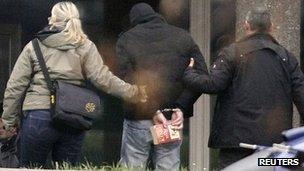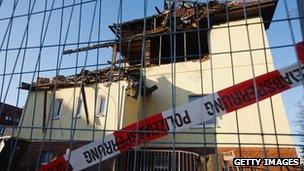German neo-Nazi murders raise awkward questions
- Published

Security services face questions over how the cell went undetected for so long
Chancellor Angela Merkel has called it a national disgrace, and her party is demanding greater efforts in the fight against right-wing extremism.
The chairman of the Bundestag's parliamentary oversight committee, Thomas Oppermann, has said he is ashamed that Germany failed to protect its citizens.
There is a widespread sense of shock in Germany following the discovery that a group of neo-Nazis had been murdering immigrants for years, and filming the bodies of their victims.
"We need to find those who helped the terrorists," Mr Opperman said, after his committee held preliminary discussions about what has become an emerging scandal. "We have evidence that they had assistance."
The fact that an extremist cell calling itself National Socialist Underground carried out at least 10 murders over more than a decade is bad enough. But now there are reports that domestic intelligence agencies probably knew about the group, but did not stop it.
The parliamentary oversight committee has been given evidence which it says confirms that an employee of the intelligence service in the state of Hesse, with "rather open right-wing political views," was present at three crime scenes, including the scene of the last murder in an internet cafe.
'Brutal threat'
The case is now in the hands of the federal police, but there are many questions about a lack of co-operation between different arms of law enforcement. The police are now reopening all unsolved cases with a possible racist motive since 1998.
Two alleged members of National Socialist Underground are dead, after committing suicide to avoid arrest. Two others are in custody.
Federal prosecutors believe they were responsible for the murders of eight Turks and one Greek in Germany from 2000 to 2006, as well as the fatal shooting of a policewoman in 2007.
The police are also connecting the group to a series of bank robberies and a bomb attack in an immigrant neighbourhood in Cologne.
Adding to the sense of alarm is the fact that the activities of the cell only came to light by chance.
Many politicians have openly expressed dismay, and accused the authorities of failing to take the threat from right-wing extremists seriously enough.
"There is plenty of evidence to suggest that the intelligence services did not fulfil their task of protecting society," said Green Party parliamentarian Hans-Christian Stroebele. "They failed."

Evidence of the group was found at this burnt-out house in Zwickau
Chancellor Merkel's Christian Democrats (CDU) passed a resolution at their annual conference this week urging the government to take action against "a brutal threat to our democratic way of life."
The CDU also called on the government to find out whether the scandal provides any grounds for banning the far right National Democratic Party (NPD).
A previous attempt to ban the NPD ended in failure when Germany's constitutional court ruled that the case was inadmissible because the party had been so heavily infiltrated by paid informers.
The German authorities describe the NPD as racist, and say the party is inspired by the Nazis.
"We need to rethink the practice of paying right-wing informers," argued Thomas Oppermann. "They have taken the money and used it to finance the building of their own organisations, while clearly giving the authorities little information of value."
- Published21 September 2011